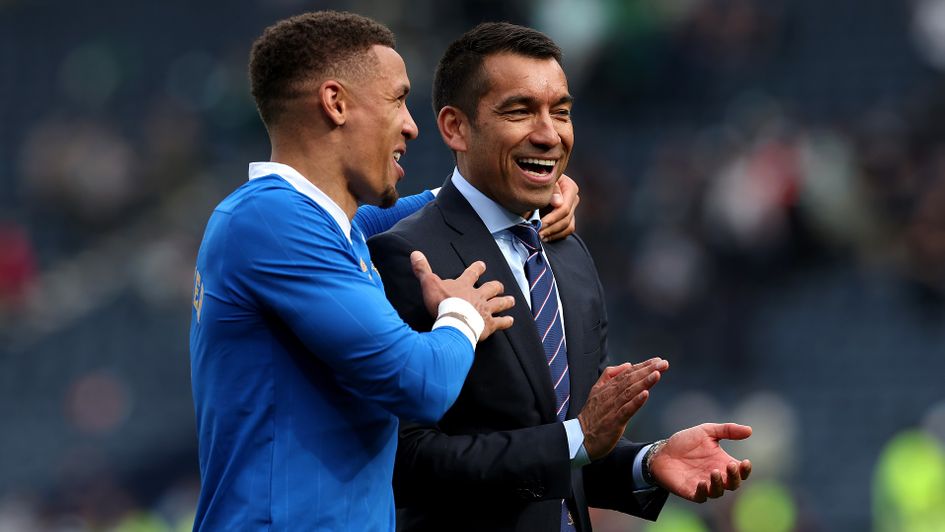At almost every stage of this season’s Europa League, Rangers were expected to fall.
First, they were drawn in a challenging group that included Lyon, Brondby and Sparta Prague. Then they were paired with competition favourites Borussia Dortmund in the play-off round.
Even after winning at Westfalenstadion, many predicted RB Leipzig would end the Ibrox side’s run in the semi-finals.
And yet Rangers will face Eintracht Frankfurt in Wednesday’s Europa League final with history on the line. Only once before have they lifted continental silverware and that was all the way back in 1972 with the European Cup Winners’ Cup - a competition that doesn’t even exist now.
Modern greatness awaits Giovanni van Bronckhorst and his players.
Gerrard departure adds to achievement
Rangers’ run to the final is all the more remarkable given the managerial change that took place at the club in November, when Steven Gerrard left for Aston Villa.
That could have derailed Rangers’ whole season, but the quick appointment of van Bronckhorst didn’t just keep things on track, it pointed the team in a new direction.
Under Gerrard, Rangers were a team build on a solid defensive foundation.
A record 25 clean sheets in 38 league fixtures helped the Govan outfit go unbeaten to win the Scottish Premiership title last season and that basis also gave Rangers a platform for runs to the Europa League round of 16 in each of the last two campaigns. This in itself was impressive.
Rangers restyled under GvB
But with van Bronckhorst at the helm, Rangers have quickly become a very different kind of outfit. Rather than sitting deep, Rangers are now pressing high.
Under Gerrard, they looked to Borna Barisic and James Tavernier for width and creativity, but the likes of Ryan Kent and Scott Wright are now being asked to carry the ball more often and create shooting opportunities.
Kent in particular has raised his game under van Bronckhorst. Only a handful of players have averaged more dribbles per 90 minutes in this season’s Europa League than the 25-year-old (2.8) who is also in the 86th percentile among Europe’s domestic leagues this season for successful dribbles that lead to a goal per 90 minutes (0.09).
While memories of Rangers’ run to the 2008 UEFA Cup final have been recalled, this team have made it this far in a very different manner.
Fourteen years ago, Walter Smith’s team played a compact, conservative game. They rode their luck at times, progressing on away goals over Panathinaikos in the round of 16 and beating Sporting CP on penalties in the semi-final.
This Rangers team, however, have imposed their own game on opponents.
They have been liberated by van Bronckhorst’s attack-minded approach. They could have sat back at the Westfalenstadion against Dortmund. Instead, they looked to exploit space in quick transition and found four goals as a reward (xG: BVB 1.97 - 2.06 RAN).
It was a similar story against RB Leipzig, who claimed a 1-0 first leg win in Germany only to be overwhelmed at Ibrox.
Van Bronckhorst was smart enough to spot the opposition’s plan to counter-press Rangers and responded by dropping John Lundstram into the defence as a third centre back to help bring the ball out from the back. This gave Rangers a platform to attack from and exploit space in behind the RB Leipzig defence.
Van Bronckhorst's flexibility
Van Bronckhorst has demonstrated his flexibility as a coach, shifting his team between formations over the course of Rangers’ Europa League run.
Against Dortmund, the Dutchman set up his side in a 4-2-3-1 before shifting to a 5-3-2. Against Red Star Belgrade, Lundstram was used in a hybrid role that saw Rangers move between a flat back four and a back three with wing backs.
When the 5-3-2 shape didn’t work in the first half away to RB Leipzig, Rangers moved to a 5-4-1 to stop the Germans from dominating so much of the ball.
For the second leg against RB Leipzig, van Bronckhorst started the same 11 players, but used them in a very different way. Indeed, the semi-final was a showcase of the 47-year-old’s tactical nous.
That tactical nous will be needed once more against Eintracht Frankfurt in the final.
The Germans proved against Barcelona in the Europa League quarter-finals that they are capable of playing through a high press. Van Bronckhorst will need a way to combat this and ensure his Rangers backline isn’t left exposed.
Fourteen years have passed since a Scottish team appeared in a continental final and on the basis of their performances in the Europa League, and the teams they have already beaten, Rangers surely stand a chance of achieving their greatest victory for 50 years.
Gerrard might have put the foundations in place, but van Bronckhorst has built on top of them.
